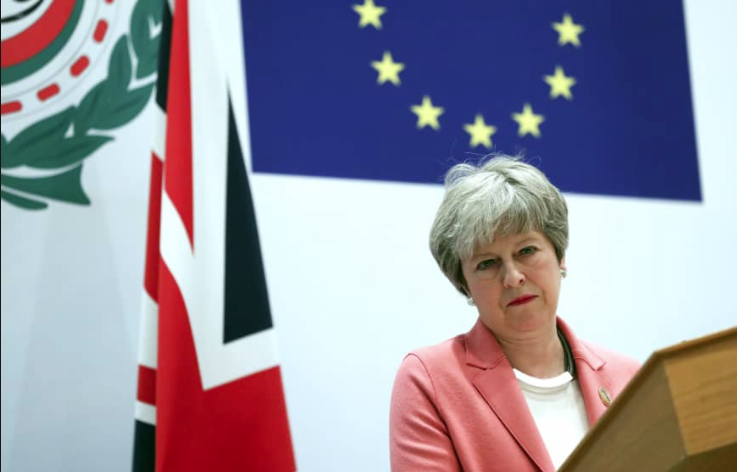A democracy that cannot change its mind is not a democracy. At the moment, the citizens of Great Britain — which consists of England, Scotland, Wales and Northern Ireland — are reckoning with this harsh reality as the clock ticks closer to Britain’s departure from the European Union at 11 p.m. on March 29. As this issue goes to print, Prime Minister Theresa May has yet to cut a formal exit deal with the European Parliament as public support for Brexit wanes. The leader of the opposition party has signaled his openness to a re-do on the public referendum that set the whole process in motion. However, a so-called “no-deal Brexit,” which will be forced if an agreement is not signed by the deadline, is still a possibility. And a no-deal Brexit would precipitate catastrophic political and economic chaos in Britain, with inevitable global ripple effects.
Thirty months ago, British citizens voted to separate from the European Union, an economic and political partnership of 28 European countries formed after World War II on the premise that a strong Europe bound together by trade and economic interdependence would be less likely to go to war. Fifty-two percent of Britons voted Leave while 48.1 percent backed Remain. Like the ascent of far-right candidates in Europe, such as Marine Le Pen of the French National Front, a good deal of anti-Europe sentiment in Britain was driven by nationalism and the fear of being bossed around by a united and hostile Europe, especially as the European Union globalized. Former Prime Minister David Cameron had promised to hold a Brexit referendum in 2013, although he believed that Liberal Democrats in Parliament would block the vote. However, when they did not, Cameron was forced to play his hand, and in the intervening months, Britain’s political and economic future has teetered on the edge of a cliff.
It is increasingly apparent that many who voted Leave did not fully understand the risks of separating from the European Union. Worse, the Leave campaign peddled deeply damaging false claims and misinformation. One of the most prominent claims was that Britain would save 350 million pounds a week from leaving the European Union, but this statistic was entirely fictitious because it did not account for the money that Britain receives in turn after paying into the European Union’s budget. Hard-right Brexiteer and MP Nigel Farage admitted to this lie just one day after the referendum. Similarly, Leavers from the Tory Party repeatedly assured the British public that leaving the European Union would not require leaving the single market (which allows goods and people to move around the European Union as if the member states were one country), but since the referendum, May has repeatedly said that Britain would have to leave the single market. Finally, Britons have been presented with a fuller picture after seeing only a partial or distorted one for months, but for now, they have no recourse.
Pro-Europe sentiment has ticked up in Britain since the referendum as former Leavers have had second thoughts, but catastrophic political blunders by May’s coalition government in Parliament have increased the likelihood of the worst-case scenario: a no-deal Brexit. If Parliament cannot cut a formal exit deal with Brussels by March 29, all European Union rules and regulations will immediately cease to apply to Britain. There will be no transition period and no agreements between Britain and the European Union on how to manage customs, trade, travel and citizens’ rights. Britain would no longer be bound by European Union regulations, so many British goods could not be sold on the European mainland, but Britain would have to comply with the European Union’s external tariffs. Hence, Britons would be forced to contend with rising prices, crashing exports and overwhelming uncertainty on the parts of both firms and consumers — a dismal economic outlook.
Perhaps the most frightening consequence of a no-deal Brexit is that it would immediately impose a hard border between the Republic of Ireland (which would remain part of the European Union) and Northern Ireland (which would exit with the rest of Britain). The border region is deprived and damaged after being torn apart by thirty years of sectarian violence between the two countries before the 1998 Good Friday Agreement brought relative peace. In the time since, a frictionless border has helped to normalize and depoliticize relations. Considering the fact that violence has centered on the constitutional status of Northern Ireland, with Protestant unionists wanting it to remain in the United Kingdom and Catholic republicans wanting to form a united Ireland, checkpoints and border posts have historically functioned as targets for terrorism. A no-deal Brexit, and the hard border that would result, would likely reinflame some of the tensions that have eased in recent decades to potentially deadly results.
Luckily, a no-deal Brexit is not inevitable. According to The Times of London, if the withdrawal agreement set for a vote on March 12 fails, May has told Parliament that she will put forward a vote on a no-deal Brexit in addition to a vote to delay the negotiation process beyond March 29; however, she would require approval from Brussels, and there is no reason to believe that many firm Brexiteers would vote against a no-deal Brexit. In addition, leader of the opposition Labour Party Jeremy Corbyn said that he was prepared to support a second referendum. No Brexit deal matches the fantasy proposed in 2016, and as the Brexit endgame approaches, Britons deserve a second say that includes the option to remain — the potential fallout of a no-deal Brexit looms too large not to try.













